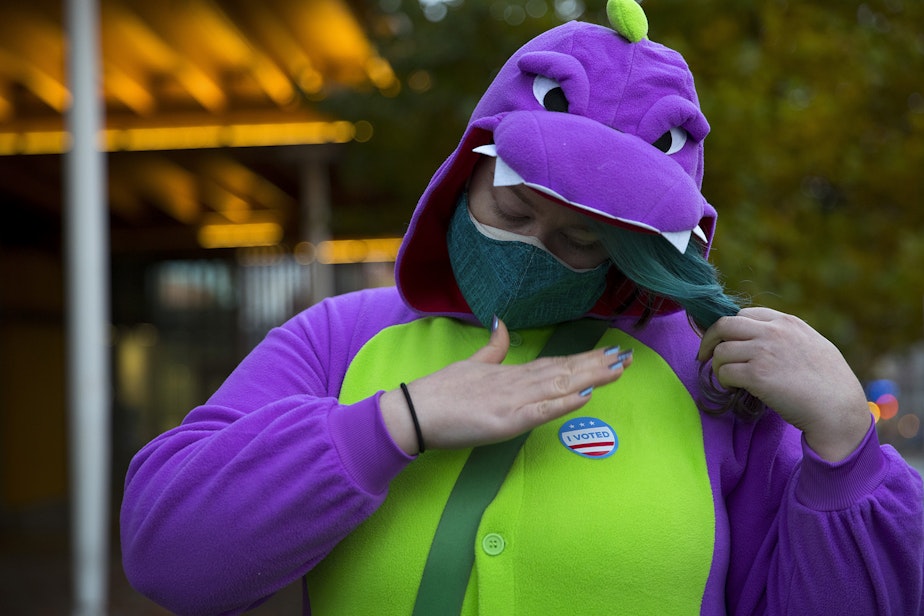Voter rights keep expanding in Washington state, as other states restrict

Governor Inslee today signed into law a bill that restores voting rights to people with felony convictions as soon as they get out of prison. This new legislation builds on a number of new voting laws that went into effect in 2019.
In context, Washington state’s expansion of voter access contrasts with some Republican-led states, where lawmakers have introduced hundreds of new laws to restrict voting.
By the end of March, at least five new laws to limit voting had passed, and dozens were still alive, according to the Brennan Center for Justice.
Democrats, including Senate Majority Leader Chuck Schumer, accuse Republicans of trying to make it harder to vote.
"Instead of doing what you should be doing when you lose an election in a democracy, attempting to win over those voters in the next election, Republicans instead are trying to disenfranchise those voters," Schumer said.
Democrats argue that their proposed 800-page voting rights law in Congress, which has stalled in the Senate, would blunt voter suppression efforts.
But many Republicans, including Kim Wyman, the Washington secretary of state, have come out against the U.S. House version of the bill, HR.1.
Sponsored
Earlier this month, Wyman told Congress that some requirements and provisions would be difficult, if not impossible, to implement as currently written. She also said the new law could “stifle innovation” in states like Washington that have expanded voter rights.
But in testifying against HR.1., Wyman also spoke in favor of the essence of the Democrats’ bill because, as she pointed out, Washington did much of it first.
“I'm proud to serve as the chief elections officer in a state that's already implemented nearly every election requirement proposed in HR.1,” Wyman said.
The reforms in Washington state and HR.1 attempt to solve inequities in voter participation.
"There's a legacy of inequality and racial inequality and voter turnout in the U.S., and that's across every state in the union,” said Jake Grumbach, University of Washington political science professor.
Sponsored
Grumbach said despite progress, there is still a big gap in who participates.
“People of color, especially Black Americans, on average have to wait in longer lines at the polling place," Grumbauch said. "They may have less access to transportation, they may have less ability to take time off from working on election day. All of these are barriers to lower income people and historically marginalized racial groups to turning out to vote.”
According to Grumbach, about half of eligible white voters cast their ballots in presidential elections years. Black voters' participation has surged in recent years to be roughly the same. But for other groups, including Latinos and Asian Americans, participation is still below 40 percent.
Addressing these inequities is partly why Washington adopted election reforms that went into effect in 2019, including “same-day registration” and “automatic voter registration,” for when you get a real ID driver’s license. So far hundreds of thousands of Washingtonians have taken advantage of both.
Another 2019 reform allows 16- and 17-year olds to pre-register before they turn 18.
Sponsored
Mustafa Agha, a Pakistani-American teenager, said he is excited to get his driver’s license when he turns 16.
“I can't wait to just drive around and just go where I need to go, you know, and do like, anything at this point," Mustafa said.
But he’s also excited to pre-register to vote when he gets his license. “It's good to be prepared in advance, because I don't want to leave stuff to the last minute," he said.
There are signs that the various voter access bills are working here. In 2020, the youth vote in Washington State jumped 13 percentage points from the last presidential election.
Pediatrician Seema Abbasi, who is originally from Pakistan, serves on the board of the League of Minority Voters here in Washington State, which advocates for many of the voting reform measures.
Sponsored
But she said even with some solid voting reforms in place, there’s still a lot of hard work to do.
“In 2020, we had a very effective go-out-and-vote campaign, which is directed towards minority groups, and we use social media, television, radio," she said.
And part of that get-out-the-vote effort, Abassi said, involves storytelling – including sharing her personal story.
“Growing up in a country where the citizens did not have a right to vote, I know what it looks like," she said. "For me, it's a huge privilege in this country to be able to vote.”
In other words, she said, even with some of the right laws in place to increase voter access, the next steps to actually make political change are voter education and mobilization




